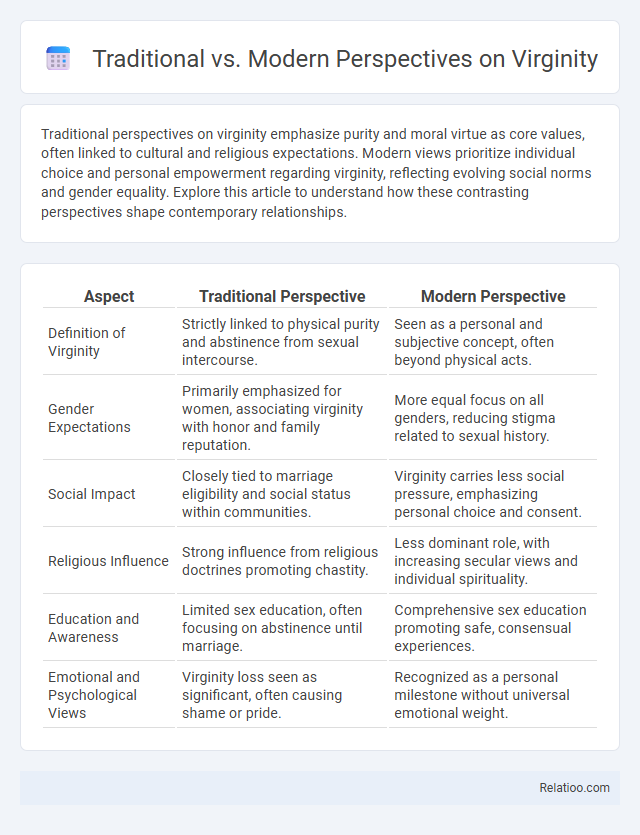Traditional perspectives on virginity emphasize purity and moral virtue as core values, often linked to cultural and religious expectations. Modern views prioritize individual choice and personal empowerment regarding virginity, reflecting evolving social norms and gender equality. Explore this article to understand how these contrasting perspectives shape contemporary relationships.
Table of Comparison
| Aspect | Traditional Perspective | Modern Perspective |
|---|---|---|
| Definition of Virginity | Strictly linked to physical purity and abstinence from sexual intercourse. | Seen as a personal and subjective concept, often beyond physical acts. |
| Gender Expectations | Primarily emphasized for women, associating virginity with honor and family reputation. | More equal focus on all genders, reducing stigma related to sexual history. |
| Social Impact | Closely tied to marriage eligibility and social status within communities. | Virginity carries less social pressure, emphasizing personal choice and consent. |
| Religious Influence | Strong influence from religious doctrines promoting chastity. | Less dominant role, with increasing secular views and individual spirituality. |
| Education and Awareness | Limited sex education, often focusing on abstinence until marriage. | Comprehensive sex education promoting safe, consensual experiences. |
| Emotional and Psychological Views | Virginity loss seen as significant, often causing shame or pride. | Recognized as a personal milestone without universal emotional weight. |
Introduction to Virginity: Evolving Definitions
Virginity, historically defined as the state of never having engaged in sexual intercourse, carries diverse cultural and social meanings across traditions and modern views. Traditional perspectives often emphasize virginity as a symbol of purity and moral integrity, deeply rooted in religious and societal norms. Your understanding of virginity evolves as contemporary perspectives highlight personal choice, emotional readiness, and the complexity of individual experiences beyond rigid definitions.
Historical Roots of Traditional Virginity Concepts
Traditional concepts of virginity originated from historical roots in patriarchal societies where a woman's purity symbolized family honor and social status. These views often linked virginity to stringent moral codes and religious doctrines that emphasized chastity before marriage, reflecting broader gender roles and control over female sexuality. Understanding this context can help you critically evaluate how modern perspectives challenge and redefine virginity beyond these longstanding cultural frameworks.
Societal Expectations in Traditional Cultures
In many traditional cultures, virginity is closely tied to concepts of purity, honor, and family reputation, often placing significant social pressure on individuals, particularly women, to remain virgins until marriage. Societal expectations emphasize chastity as a moral standard, reinforcing gender roles through religious and cultural norms that can restrict personal freedom. Modern perspectives challenge these views by promoting individual autonomy and sexual rights, highlighting the evolving understanding of virginity beyond rigid social constructs.
Gender Roles and Virginity: Past vs Present
Traditional perspectives link virginity tightly to gender roles, often emphasizing chastity as a female virtue tied to family honor and social expectations. Modern views challenge these norms, advocating for personal autonomy and questioning the double standards historically imposed on women versus men regarding virginity. Your understanding of virginity today reflects a shift toward equality and individual choice, moving beyond rigid gender roles that once defined its meaning.
Modern Reinterpretations of Virginity
Modern reinterpretations of virginity challenge traditional notions by emphasizing personal choice, emotional readiness, and cultural diversity over mere physicality. Researchers highlight that virginity is a fluid concept shaped by social context rather than a fixed biological state. This shift encourages inclusive dialogues about sexuality, consent, and individual empowerment across different societies.
Media Influence on Virginity Narratives
Media influence significantly shapes virginity narratives by contrasting traditional views that emphasize purity and moral values with modern perspectives prioritizing individual choice and sexual empowerment. Your perception of virginity is often molded by films, television, and social media, which either reinforce stigmas or promote open dialogue and acceptance. These platforms contribute to evolving cultural attitudes by challenging outdated stereotypes and highlighting diverse experiences related to virginity.
Psychological Impact: Shame, Guilt, and Empowerment
Traditional perspectives on virginity often associate psychological impacts such as shame and guilt, deeply rooted in cultural and religious norms emphasizing purity and moral conduct. Modern perspectives tend to reframe virginity as a personal choice, promoting empowerment and positive self-identity by challenging outdated stigmas and encouraging open conversations about sexuality. Psychological outcomes vary widely, with empowerment linked to autonomy and informed decisions, while shame and guilt more commonly arise from external judgments and internalized societal pressures.
Virginity and Relationship Dynamics
Virginity often holds different meanings in traditional versus modern relationship dynamics, influencing how intimacy and trust are perceived. Traditional perspectives may emphasize virginity as a symbol of purity and moral value, shaping expectations in romantic relationships. Your understanding of virginity can impact communication and emotional connection, reflecting evolving societal attitudes toward sexuality and partnership.
Religion, Morality, and Changing Attitudes
Traditional perspectives on virginity often emphasize religious doctrines and moral values that associate purity with spiritual virtue and societal honor. Modern perspectives view virginity more fluidly, recognizing changing attitudes that prioritize personal choice and individual experiences over rigid cultural or religious norms. Your understanding of virginity navigates between these evolving interpretations shaped by both historical beliefs and contemporary shifts in morality.
Towards a More Inclusive Perspective: The Future of Virginity
Virginity has traditionally been defined by rigid cultural and religious norms, often centering on physical purity and moral worth, which can marginalize diverse experiences and identities. Modern perspectives challenge these narrow definitions by emphasizing personal meaning, consent, and emotional readiness, fostering a more inclusive understanding of virginity. Your approach to virginity can evolve toward embracing this inclusive perspective, recognizing it as a complex and individualized concept rather than a fixed status.

Infographic: Traditional vs Modern perspectives on virginity
 relatioo.com
relatioo.com